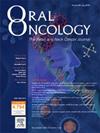Letter to the Editor: Impact of the COVID-19 pandemic on diagnosis and disease stage in HPV-positive oropharyngeal cancer: insights and future directions
IF 3.9
2区 医学
Q1 DENTISTRY, ORAL SURGERY & MEDICINE
引用次数: 0
Abstract
The recent publication titled “The Collateral Impact of the COVID-19 Pandemic on HPV-Positive Oropharyngeal Cancer Diagnosis” offers a timely investigation into how the pandemic influenced diagnostic delays and disease severity at presentation among patients with oropharyngeal cancer (OPC). Given that delays in diagnosis are closely associated with disease progression and poorer clinical outcomes, this study underscores the critical importance of timely detection. By analyzing and comparing patient cohorts from pre-pandemic and pandemic periods, the authors reveal shifts in diagnostic trends during a time of global healthcare disruption. The study’s robust sample size of 157 consecutive patients, coupled with the use of objective clinical metrics such as TNM staging and gross tumor volumes (GTVs), enhances the reliability of its findings. A notable increase in the proportion of patients presenting with advanced nodal disease and stage III cancer during the pandemic is reported. Although statistical significance was not reached for diagnostic or treatment delays, the clinical relevance of these trends remains clear. Approximately half of the delays were attributed to COVID-19-related factors, including reduced healthcare access and patient hesitancy. These findings have substantial implications for healthcare systems and policymakers. The authors advocate for targeted interventions, such as public awareness campaigns and virtual triage, to reduce delays in future health emergencies. Further multicenter and prospective studies are encouraged to explore regional variations and patient-reported outcomes. I commend the Oral Oncology editorial team and authors for their commitment to publishing impactful research that fosters innovation and improves patient care in head and neck oncology.
致编辑的信:COVID-19大流行对hpv阳性口咽癌诊断和疾病分期的影响:见解和未来方向
最近发表的题为“COVID-19大流行对hpv阳性口咽癌诊断的附带影响”的出版物及时调查了大流行如何影响口咽癌(OPC)患者的诊断延迟和疾病严重程度。鉴于诊断延迟与疾病进展和较差的临床结果密切相关,本研究强调了及时检测的重要性。通过分析和比较大流行前和大流行时期的患者队列,作者揭示了全球医疗保健中断期间诊断趋势的变化。该研究的157例连续患者的强大样本量,加上客观临床指标(如TNM分期和总肿瘤体积(gtv))的使用,增强了其研究结果的可靠性。据报道,在大流行期间,出现晚期淋巴结疾病和III期癌症的患者比例显著增加。虽然诊断或治疗延迟没有达到统计学意义,但这些趋势的临床相关性仍然很清楚。大约一半的延误归因于与covid -19相关的因素,包括医疗保健机会减少和患者犹豫。这些发现对医疗保健系统和政策制定者具有重大意义。这组作者提倡有针对性的干预措施,例如提高公众认识运动和虚拟分诊,以减少未来突发卫生事件的延误。鼓励进一步的多中心和前瞻性研究来探索地区差异和患者报告的结果。我赞扬口腔肿瘤学编辑团队和作者致力于发表有影响力的研究,促进创新并改善头颈部肿瘤患者护理。
本文章由计算机程序翻译,如有差异,请以英文原文为准。
求助全文
约1分钟内获得全文
求助全文
来源期刊

Oral oncology
医学-牙科与口腔外科
CiteScore
8.70
自引率
10.40%
发文量
505
审稿时长
20 days
期刊介绍:
Oral Oncology is an international interdisciplinary journal which publishes high quality original research, clinical trials and review articles, editorials, and commentaries relating to the etiopathogenesis, epidemiology, prevention, clinical features, diagnosis, treatment and management of patients with neoplasms in the head and neck.
Oral Oncology is of interest to head and neck surgeons, radiation and medical oncologists, maxillo-facial surgeons, oto-rhino-laryngologists, plastic surgeons, pathologists, scientists, oral medical specialists, special care dentists, dental care professionals, general dental practitioners, public health physicians, palliative care physicians, nurses, radiologists, radiographers, dieticians, occupational therapists, speech and language therapists, nutritionists, clinical and health psychologists and counselors, professionals in end of life care, as well as others interested in these fields.
 求助内容:
求助内容: 应助结果提醒方式:
应助结果提醒方式:


